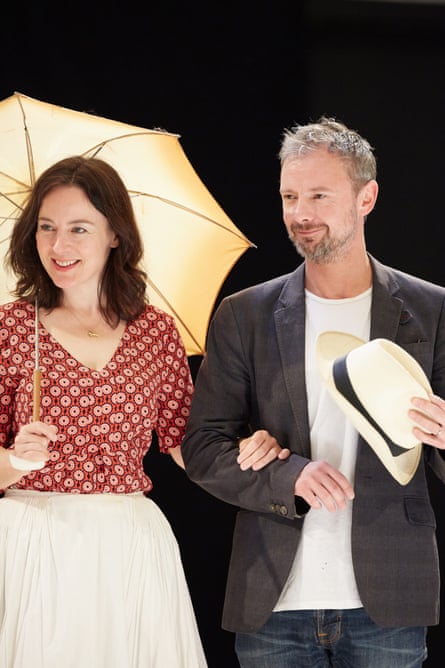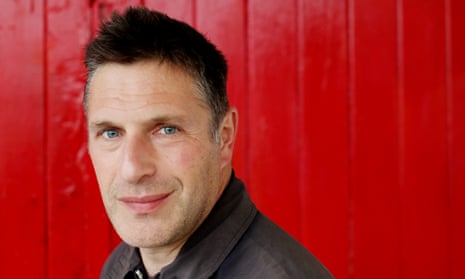High up in the National Theatre, Patrick Marber is huddled in the corner of a small, drab room. “Is this going to be in-depth?” His fingers are bunched around a mug of instant coffee. “I was told the Guardian wanted something in-depth. But I thought, ‘I haven’t got enough depth to plumb.’” He grins ruefully.
We’ve only been here a few minutes, but his exchanges are settling into a pattern: it’s hard to tell where seriousness ends and the joke begins. Or perhaps it’s the other way round – seemingly innocent humour that turns lethal.
Marber’s work has the quality, too. Whether in his debut play, Dealer’s Choice (1995), which wryly examined the agonies of lonely, frustrated men addicted to gambling, or his screenplay adaptation of Zoë Heller’s Notes on a Scandal (2006), few contemporary writers have teased apart the faulty workings of the human heart with such wit and surgical precision. Most audiences will know Marber’s name from Closer, the 1997 play that became an international sensation, then a starry Hollywood movie, and was revived earlier this year at London’s Donmar Warehouse. With a series of interlocking, almost Jacobean sexual betrayals and an eerily prescient plot twist involving an online chatroom, the script rams home the vacuity and folly of desire, particularly in a world where it can ostensibly be satisfied on tap. “Oh, I’m not totally sure I see it that way,” says Marber. “It’s quite a tender play, really. Most of what I write is comedy.” Perhaps the joke is on us.
This summer he is back where Closer began, at the National. In fact he is practically in residence: his new play, The Red Lion, opened last month; when we meet he is in final rehearsals for Three Days in the Country , a version of Ivan Turgenev’s study of love and lust, thwarted idealism and slow-fizzling marital despair. If you’re puzzling over what the Turgenev is called, don’t worry: Marber has made abbreviations, the title being one. Turgenev’s month of rural un-bliss has been condensed to 72 hours; the script is tighter and sharper, more pointed, a touch more painful.
“It’s a wonderful play, full of beauty, but it’s a big old beast,” Marber reflects. “My instinct was to distil it, and every now and then invent and change. Some people who know the work will go, ‘hang on’, but generally speaking it’s the same people doing fairly much the same stuff.” The rueful smile again. “Generally speaking.”
Perhaps the most famous thing about Turgenev’s play, written in the early 1850s but only premiered in 1872, is that it is Chekhov a generation before Chekhov. With its interlocking stories of the unhappily married Natalya and Arkady, Natalya’s dithering and never-consummated relationship with Arkady’s best friend, and a calamitous romance between a tutor and a bright-eyed ingenue, it is easy to spot ingredients the younger playwright would deploy so devastatingly in The Cherry Orchard and Uncle Vanya. In both Turgenev and Chekhov, the country-house setting allows the characters to eddy and collide, sour self-realisations to emerge. The oppressive languor of the Russian summer becomes a guarantee that nothing can ever be resolved.
“Not that much happens, but everything happens,” agrees Marber. “The fundamentals feel Chekhovian – the slight driftiness of it, the steady accumulation of plot, all these different plots spinning – but Turgenev came up with that form.”
Wasn’t Chekhov adamant that his plays, too, were comedies? He smiles. “I think I write serious comedies. I would love to be able to write for pure pleasure, but the undertow is always loneliness.” He makes a gesture of helplessness. “At the age of 50 you have to recognise these things keep recurring.”
If Marber sometimes has the air of a man struggling to believe he has made it this far, it is with good reason. In the 1990s it was as if he could do no wrong: there were the brilliant collaborations with comedians such as Armando Iannucci, Steve Coogan and Chris Morris (Alan Partridge, The Day Today); there was Dealer’s Choice, which made his name, and a smart update of Strindberg’s Miss Julie to Britain on election night in 1945, when the future of the country hung in the balance. Even when the film version of Closer opened to mixed reviews (the Guardian declared it had “the cutting edge of a butter knife”), Marber’s status as the English Mamet, or an in-yer-face Pinter, seemed assured. Great things were expected.
But things were already beginning to go awry. In 2001, Howard Katz, an examination of male midlife crisis, sank amid lukewarm reviews. Don Juan in Soho, though politely received, only achieved a brief run at the Donmar. There were screenplays, notably Notes on a Scandal, but the words came less readily. One day they dried up altogether. Recently Marber told the Independent that he didn’t write a thing for “four or five years”. In 2012, he considered throwing in the towel.

“I don’t want to bore on about it,” he says hastily when I ask. “But if you can’t work, you’ve got a big problem. My vision for my 40s was that I was going to write five plays, because that’s how many I’d written in my 30s. And my 40s were a disaster.”
The crisis was a long time brewing, he thinks now. One factor – perhaps perversely – was Closer, which he directed as well as wrote: “I really enjoyed its success at the time, but I didn’t write anything for two years. It was exhausting.” Another factor is the decision he and his wife Debra Gillett took in 2007 to relocate to the Sussex countryside with their three young boys. The decision now appears to flummox him: “I thought I could write anywhere, but it was too peaceful, just too … nice. I was having a coffee in Waitrose in Crowborough, reading the Guardian sports pages, and I suddenly thought, I need to get out.” He grimaces. “I was only in my mid-40s.”
While – as in Turgenev – this countryside sojourn may have threatened Marber’s emotional health, it also offered a way out. One turning point was his acquisition, with a group of fellow fans, of Lewes FC, turning it from a club nearing bankruptcy to a flourishing community-owned enterprise. Another was the play that resulted, The Red Lion, about a struggling team whose members (somewhat like Lewes’s) are doing their utmost to square a utopian belief in the beauty of the beautiful game with the financial ugliness that dominates contemporary football. The script emerged in painful fits and starts, and only found its final form when he and the family moved back to London a few years ago.
Marber is quick to say that The Red Lion would never have happened had it not been for director Ian Rickson, to whom Three Days is dedicated: “He got me back at my desk and read every draft, read it act by act as I was delivering it. He was a great midwife. I absolutely owe my ability to write again to Ian.”
I’m struck by how full of tenderness both plays are, I say: if the dialogue in Marber’s earlier work is steely, speeches scissoring sharply across each other, what he has produced recently seems more compassionate in tone; more autumnal, perhaps.
He holds the thought, considering it from every angle. “That might be right,” he says eventually. “The Red Lion is a lot about childhood, Three Days, too; a lot of it is seen through the eyes of a 10-year-old boy [Natalya and Arkady’s son]. Having children myself is a lot to do with that. I feel I know these boys. But I hope that all my plays feel like plays written by me. They have a particular flow in them.” He sighs, mock-lugubriously. “I’m condemned to be the writer I am.”
Marber’s bouts with his demons have been well-chronicled: his struggles with gambling, which landed him in Gamblers’ Anonymous (though it was a fiction he lost £10,000 a night: “I wish I’d had that kind of money”); the therapy that he has been in, on and off, since the age of 17. In conversation, he is a curious mix of openness and a sweet, faintly diffident shyness.
Does he still find writing hard? He scans the skyline. “Ages ago I was with Tom Stoppard. I was moaning about something, he was moaning about something. And he said,” – he shifts into flawless Mitteleuropean – “‘Patrick, to be a playwright is to have your heart broken every day.’” He laughs. “And I was thinking, like, ‘Shit, even Tom thinks that, and he’s God.’”
He thinks some more. “But your heart also skips a beat, when you’re in rehearsals, when someone’s saying your lines … ”
At 50, Marber looks like a man in a hurry. In addition to the National Theatre plays and the revival of Closer, he has another play “sort of on the go”, a screenplay that he’s hoping to write this winter if it gets the green light, and a new script for the National’s Connections festival of drama for young people. He is writing every day, determined not to get comfortable. “I would like to write a ballet, I’d like to write a libretto, I want to write a musical … I’ve got a lot of other things I’d like to do.” Inspired by a two-minute appearance in James Graham’s election-themed The Vote (the same role Jude Law did on another night, he beams), he’s even keen to get back on stage.
What sort of parts is he after? “I’ll write it myself if no one else does. Small comic cameo, couple of scenes. I remember this from being a standup: there’s no feeling stranger, being backstage and someone says, ‘please welcome Patrick Marber’, and suddenly you’re there … The same person but transformed.” His eyes are wide. “How marvellous.”
He looks aghast when I remind him he once said that his ambition was to write a play that survived. “Now I just hope to write anything,” he says. “The chances of your plays being remembered are minuscule. These days my bar is very, very low.”
This time, when it comes, the smile isn’t sad at all. “Just doing it is enough.”

Comments (…)
Sign in or create your Guardian account to join the discussion